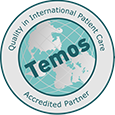The surgical treatment of a major Deep Venus System (DVS) problem in a young patient was a huge success. The surgery was recently performed at Metropolitan General, and opened a new chapter in the field of Vascular Surgery in Greece.
Namely, it is the first time that a vascular surgery in the lower extremities DVS for the restoration of chronic obstructive lesions of the femoral-iliac veins is successfully conducted. The procedure was performed by Vascular Surgeon Nikolaos Tsekouras, PhD awarded by the University of Athens, Chief of the 3rd Department of Vascular Surgery at Metropolitan General, and his team. The surgery design was made with the valuable contribution of Dr. Anthony James Comerota, Professor at the University of Michigan, USA. The University of Michigan is among the few in the United States, and globally, to provide this treatment.
A serious progressively deteriorating disease
A 27-year-old male patient was suffering from major obstructive lesions in his right lower extremity femoral and iliac veins. The condition was blocking blood transfer from his leg to his torso. Over the last years, the patient was experiencing intense discomfort in his right leg, but mainly severe pain during walking.
In addition, the patient was suffering from major edema (swelling) in his right lower extremity and had open wounds right above his ankles. Being conservatively managed, his wounds were very difficult to heal and manifested frequent recurrences. The patient’s condition was progressively deteriorating and this was a major manifestation of a venous disease called Post-Thrombotic Syndrome (PTS).
Surgical restoration: complex and combined
The blood circulation restoration surgery in the Deep Venous System (DVS) was major complex and combined. The procedure combined open surgical and endovascular techniques (hypoid surgery). The use of endovascular U/S was of particular assistance. As Mr. Tsekouras explained, the endovascular U/S imaging of the affected vein was performed with a special catheter bearing a micro-ultrasound device at one tip.
The patient had no intra- or post-operative complications. Pain and accompanied discomfort stopped immediately after the surgery, and the patient was able to walk unassisted within the Hospital’s premises right from the first post-operative day. The edema’s release was impressive, the calf area became milder to touch, and the ulcer had an excellent healing progress. Ten months following the procedure, the surgical outcome remains excellent, and the patient has no symptoms and chronic open wounds.
Dr. Nikolaos Tsekouras, Chief of the 3rd Department of Vascular Surgery at Metropolitan General, stated: “We are very pleased that we paved a new way in the field of Vascular Surgery in Greece, i.e. Deep Venous System (DVS) surgery. This allows us to provide substantial medical assistance to people, who, up to now, suffered major motility impairment due to obstructive lesions in the lower extremities central veins.”
Dr. Nikolaos Liasis, MD, PhD, Scientific Associate to the University of Athens, Vice-Chair of the Hellenic Society for Angiology, stated inter alia: “Post-Thrombotic Syndrome (PTS) constitutes a serious condition with significant morbidity. Proper planning with contemporary imaging methods is the first important step to modern surgical treatment.”
Dr. Anthony James Comerota, Professor of the University of Michigan, USA, stated: “It is quite pleasing to watch your trainee observe and learn a complex surgical procedure, modify it and finally apply it in his country to relief patients from their pain.
The greatest benefit for the patient’s health was the result of Dr. Tsekouras’ experience and expertise. The key emphasis is that most physicians treating this group of patients believe that treatment options for Post-Thrombotic Syndrome (PTS) are limited, and that their patients have to come to terms with the idea of impairment and accept the fact of leading a life with pain.
Having performed the first surgical repair in the Deep Venous System (DVS) in Greece, Mr. Tsekouras will from now on be invited by physicians, based both in Greece and abroad, to assess and effectively manage such complex cases. These patients are very fortunate to have Dr. Tsekouras standing alongside them in the improvement of their serious Post-Thrombotic Syndrome (PTS)”.
































